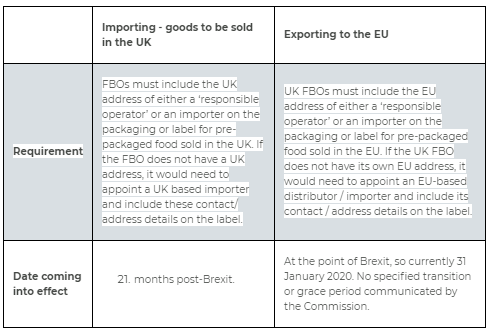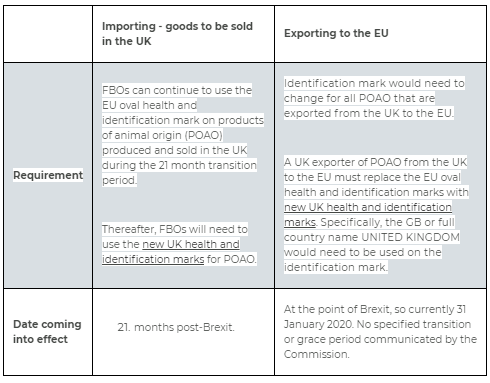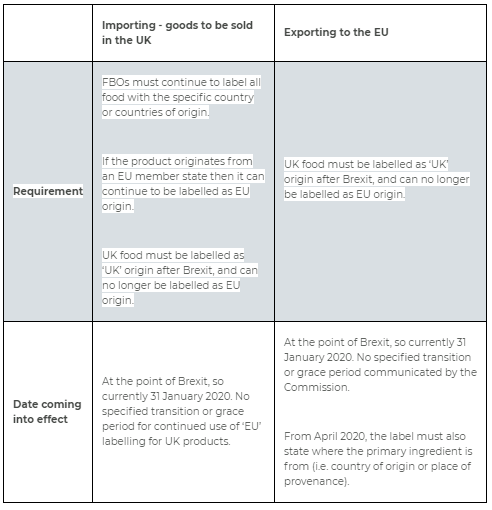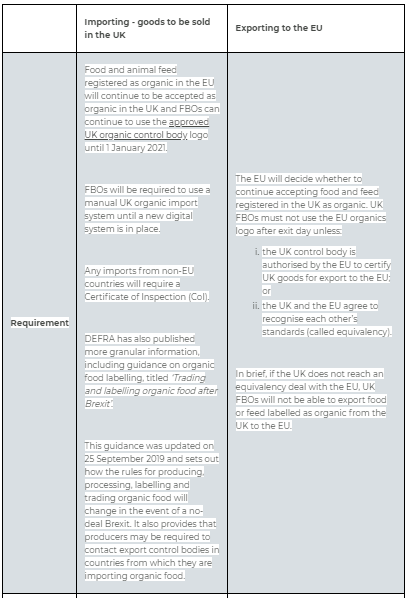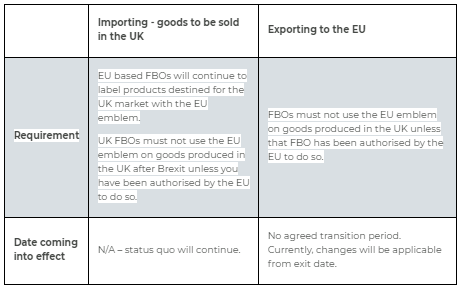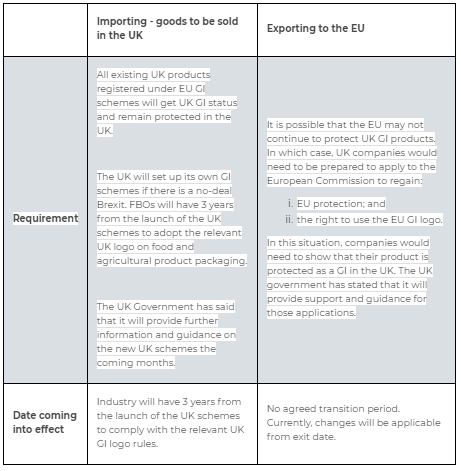The UK food & drink industry is a major growth sector, generating an annual turnover of £104 billion and an estimated export market exceeding £23 billion. Recent figures quoted by Scotland Food & Drink highlight that approximately two thirds of food produced in Scotland is exported to the EU. Combining that with whisky and other drink exports, the annual value of Scottish food and drink exports to the EU is approximately £2.5 billion.
Clearly, a key driver for sustained growth is ready access to the EU market. While the food and drink sector continues to thrive, the prospect of a no-deal Brexit presents significant challenges. Although now pushed back into the new year (exit currently expected for 31 January 2020), the UK’s anticipated withdrawal from the EU is already having impacts on many businesses. Let’s look at the changes Brexit would require to product labelling and outline some of the proactive measures businesses can take to mitigate the impact of a possible no-deal Brexit.
EU food labelling rules apply to all food placed on the EU market, independently of its place of production. More specifically, EU law governing the provision of consumer information on food products (including labelling compliance) is primarily contained in Regulation 1169/2011/EC on the Provision of Food Information to Consumers (“FIC”).
On 19 December 2018 the UK Department for Environment and Rural Affairs (‘DEFRA’) published a guidance paper titled ‘Producing and labelling food if there’s no Brexit deal’ (the “Food Labelling Technical Notice”), which inter alia outlined proposals that would enable food business operators (“FBOs”) to continue to allow food showing an EU address to be placed on the UK market for a period of six months after a no-deal Brexit.
However, the Food Labelling Technical Notice was withdrawn on 1 March 2019. The replacement DEFRA guidance was first published on 5 February 2019 and was most recently updated on 23 August 2019. That guidance is titled ‘Food and drink labelling changes if there's a no-deal Brexit’ (the “DEFRA Food Labelling Guidance”. The DEFRA Food Labelling Guidance is separated into: (i) goods to be exported from the UK to the EU; and (ii) goods sold in the UK.
One of the significant changes in the updated DEFRA Food Labelling Guidance is a longer 21-month transition period to apply to labelling changes for EU products sold in the UK from exit day (currently 31 January 2020). The intention is to provide FBOs with a practical and reasonable grace period to implement appropriate labelling changes for EU labelled goods that are placed on the UK market. It should be noted that these proposals are not legally binding and remain subject to approval by the UK’s devolved administrations, which have competence over the labelling of food and drink products. It should also be noted that to date the European Commission has not committed to any equivalent transition period.
A high level summary of the anticipated no-deal labelling changes and relevant transition periods applicable to both UK imports and exports are presented in the Appendix to this article.
A core regulatory term under the FIC is the concept of an FBO, which is defined as the operator responsible for providing food information and under whose name or business name the food is marketed (or, if that operator is not established in the EU, the importer into the EU market). This is an important principle as it sets out the requirement that UK FBOs will need to have either: (i) a responsible operator based in an EU member state; or (ii) access to an EU-based importer.
At present, a UK business selling pre-packaged foods in the EU can provide the address of the UK business on the label. However, in a no-deal scenario, UK businesses selling products to EU jurisdictions will need to include on each product label a name and EU address of the responsible operator under whose name the food is marketed in the EU (and who would therefore be the FBO for EU purposes). The UK address of an FBO would no longer be valid to ensure continued EU market access.
A UK address together with an EU address on the label would mean that the label is valid for both the UK and EU markets. However, if a UK company does not already have operations established in the EU, it would be required to implement one of the following options in order to maintain EU market access:
- engage an existing EU distributor to act as an EU importer; or
An FBO has extensive compliance obligations. These are prescribed under Article 8(2) of FIC and include: ensuring the presence and accuracy of the food information in accordance with the FIC (and the requirements of the relevant jurisdiction); maintaining responsibility for any changes that are made to food information; and verifying compliance with the requirements of food information law and national provisions relevant to their activities.
Engaging an existing EU distribution partner or appointing a standalone importer to take on the role of FBO within the EU may appear to be a logical and practical measure for FBOs with a UK-only presence. However, the EU distributor / importer will acquire responsibility for ensuring that the labels affixed to all products placed on the EU market comply with food information legislation and as such, UK FBOs should anticipate that the distributor / importer would seek extensive contractual warranties and indemnification with respect to labelling compliance. Implementation of an appropriate contractual framework and a clear delineation of roles and responsibilities between the UK FBO and the appointed distributor / importer will be critical.
For further information contact Grant Strachan, Charles Livingstone, or your usual Brodies contact. Also do visit our Brexit Hub for regular updates on Brexit related issues, including our Brexit checklist for businesses.
Useful information
1: FBO address
2: EU health and identification marks
3: Country of origin
4: EU organic logo
5: EU emblem
6: Geographical Indications (GI)





